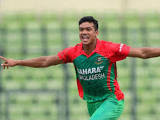Last week, a New York Times oped criticised the breadth of the Bangladesh Law Commission's proposed new law, now titled, ‘Bangladesh Liberation War (Denial, Distortion, Opposition) Crime Law’ - often referred in short as the 'Liberation War Denial Crimes Act'.
This post provides a translation of the key sections of the proposed legislation. This text is almost identical to the text that was put out for expert consultation, and which was the basis of the NYT oped
As one can see, the offences are very broad and go way beyond 'denying' genocide or showing support for crimes committed during the war - which are the kind of offences found in the European 'holocaust denial' offences.
This post provides a translation of the key sections of the proposed legislation. This text is almost identical to the text that was put out for expert consultation, and which was the basis of the NYT oped
Section 4(2) sets out the offences - and is the crucial section.
Section 5(2) states that if anyone convicted for the crimes mentioned in section 4 repeats these crimes again, 'he will face double the punishment for what he received in the first offence' and that if someone is convicted for more than one crime at a time 'then punishment will be carried out in a consecutive manner.'
Section 6(1) states that anyone who provides any assistance or conspires to commit an offence he will face the same punishment as the principal offender
Section 7 sets out the procedure. It states that anyone can file a case in a police station or in a local court. If the case is filed in court, before taking the case, the court will analyse the allegation and question the alleged person and conduct the investigation as they consider appropriate. The trial will be conducted under the code of criminal procedure. The government can appoint one or more special prosecutor to conduct the prosecution.
Section 12 states that that the law applies to any Bangladeshi citizen who commits this offence outside Bangladesh.
"Any denial of the following subject in any media of any nature or in any manner will be considered as offence of distortion of the history of liberation war and will be considered as a crime
(a) denying events that were for the preperation of the liberation war betwen 14 August 1947 to 28 Feb 1971
(b) denying events that were for the preperation of the liberation war between 1 March 1971 to 25 March 1971
(c) denying events that were for the preperation of the liberation war bweteen 26 March 1971 to 16 December 1971
(d) Giving a malicious statement in any local or foreign media that undermines any events related to the liberation war
(e) Misrepresentation or devaluation of any government publication, so far published, on the history of the liberation war;
(f) Representing the liberation war history inaccurately or with half truth in the text books or in any other medium
(g) Trivialising any information related to the martyrs, female war heroines, the killing of civilians, arson, rape and looting
(h) Mocking any events, information or data about the liberation war
(i) Committing contempt of the liberation war by calling the liberation war anything other than a historic fight for the nation’s independence
(j) showing justification for or publicising support for various criminal activities conducted by the Pakistan army in 1971 and Al Badr, Razaker, Al Shams and members of the Peace Committees As the Auxillary forces of the Pakistan army.
(k) Showing support to the crimes against humanity, crimes against peace, genocide and other war crimes or calling into question or carrying out false propaganda about the trials that deals with these crimes."Section 4(2) states that
"Any supporting activities of any kinds of activities mentioned in subsection (1) will also be considered a crimes under this law."Section 5(1) states that the sentence for committing an offence under section 4 is from 3 months to five years imprisonment as well as a fine of upto Tk 1 crore.
Section 5(2) states that if anyone convicted for the crimes mentioned in section 4 repeats these crimes again, 'he will face double the punishment for what he received in the first offence' and that if someone is convicted for more than one crime at a time 'then punishment will be carried out in a consecutive manner.'
Section 6(1) states that anyone who provides any assistance or conspires to commit an offence he will face the same punishment as the principal offender
Section 7 sets out the procedure. It states that anyone can file a case in a police station or in a local court. If the case is filed in court, before taking the case, the court will analyse the allegation and question the alleged person and conduct the investigation as they consider appropriate. The trial will be conducted under the code of criminal procedure. The government can appoint one or more special prosecutor to conduct the prosecution.
Section 12 states that that the law applies to any Bangladeshi citizen who commits this offence outside Bangladesh.


















